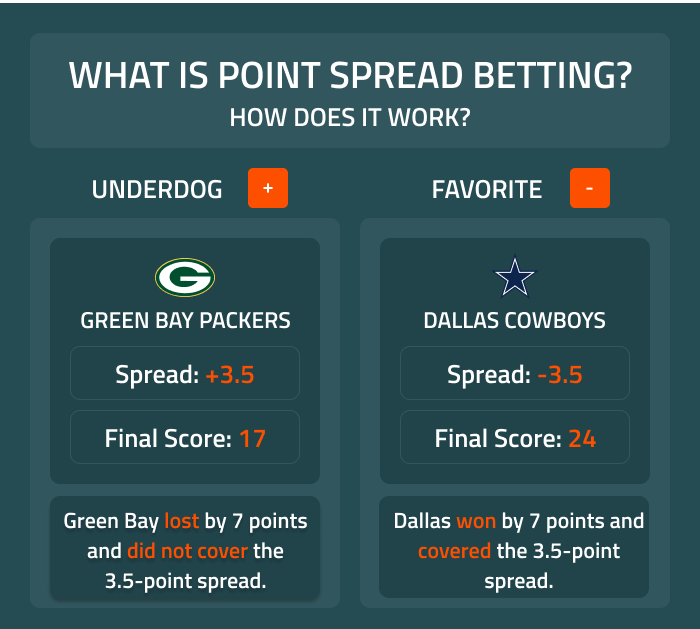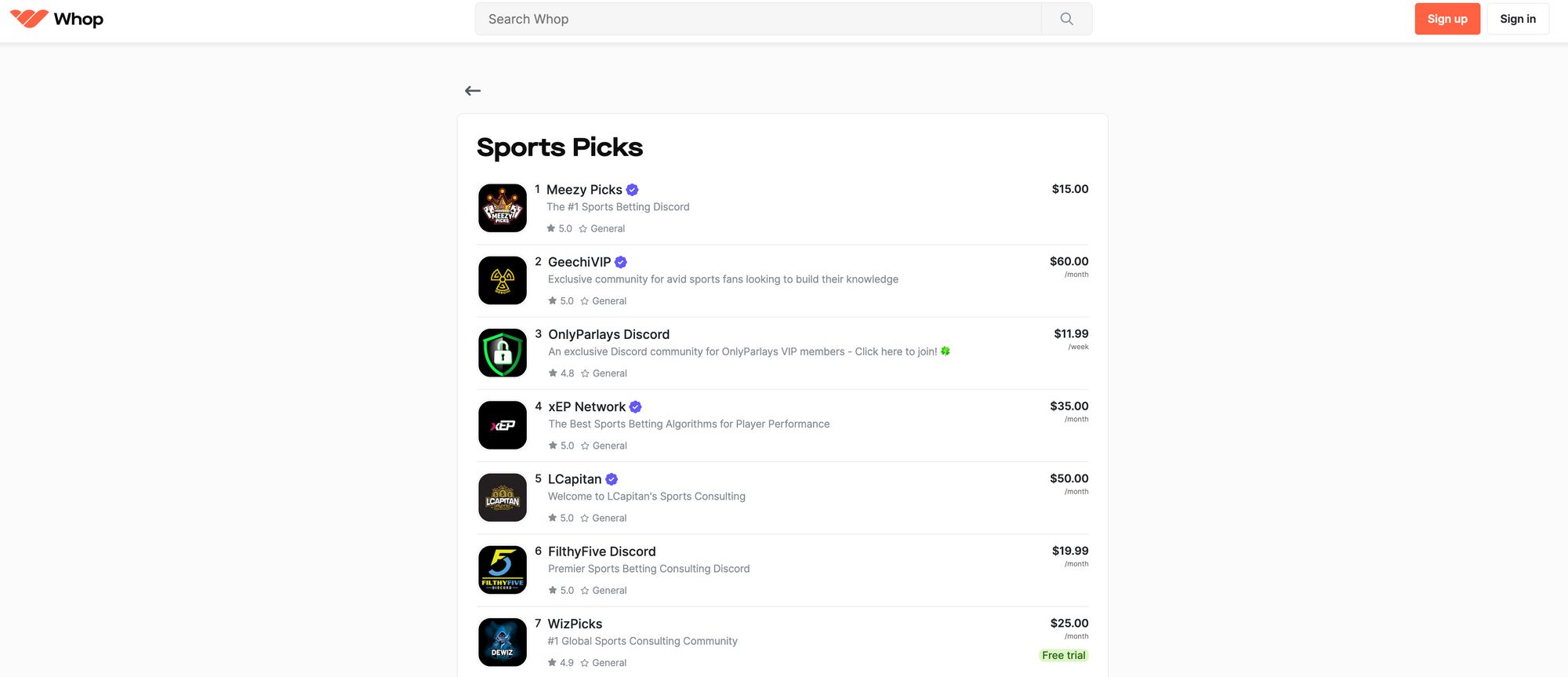Sports betting is a popular activity that involves predicting the outcome of a game or event and placing a wager on the result. Many different types of bets can be placed, each with its own set of rules and payout structure. One of the most popular types of bets is betting against the spread.
This comprehensive guide will explore what it means to bet against the spread, including the definition of "the spread," how it works, and the pros and cons of this type of bet. We will also provide examples of big wins and losses and tips for improving your betting against the spread.
We’ll also highlight Whop.com's Discord communities for sports betting and sports handicappers, which can provide valuable data and insights to help new and experienced betters be more successful. Let's jump in!
What is Point Spread?
Simply put, point spread is a number set by oddsmakers to give a perceived "balance" to both teams in a given matchup. This number is essentially a handicap and is designed to level the playing field so that the odds of either team winning are similar.

The point spread is essentially a prediction of the margin of victory by which the favorite team will win.
For example, if the point spread is 3.5 points and Team A is favored to win, they would need to win by more than 3.5 points for a bet on Team A to win against the spread. If Team B is the underdog, they would need to lose by less than 3.5 points or win the game for a bet on Team B to win against the spread.
Point spreads can change as the game approaches, based on the bets placed and other factors such as injuries or weather. It's important to understand the point spread and adjust your bets accordingly. A point spread is crucial when betting against the spread, as it can greatly impact the outcome and payout of your bet.
What Does It Mean to Bet Against the Spread?
When betting against the spread, also known as ATS betting, a bettor predicts whether a team will win by more or less than a certain amount of points, known as the "spread." The sportsbook determines the spread and can fluctuate based on the bets placed.
Imagine a football game against the Cincinnati Bengals and the Baltimore Ravens. Let's say the Cincinnati Bengals are favored to win by 7 points in that football game. If a bettor believes the Bengals will win by more than 7 points, they would "bet against the spread" and take the Bengals -7.
If a bettor believes the Bengals will win by less than 7 points or lose the game, they would "bet against the spread" and take Baltimore Ravens +7. If the Bengals win the game by exactly 7 points, the bet is considered a "push," and the bettor's wager is returned.

Betting against the spread is a way to level the playing field, as it gives the underdog team a virtual point advantage, making the betting more competitive. It also allows bettors to win even if their chosen team loses the game as long as they cover the spread.
But, it can also be more difficult to predict as it considers the margin of victory, not just the winning team. The spread can change as the game approaches, so staying informed and adjusting your bets accordingly is important.
What Do “Cover the Spread” and “Against the Spread” Mean?
"Covering the spread" refers to a team winning by more or less than the point spread set by the sportsbook. When a team "covers the spread," it means that they have won by a margin greater or smaller than the point spread, and therefore the bet on that team would be a winning one.
On the other hand, "Against the Spread" or "ATS" refers to the record of a team or a bettor when betting against the spread. It is a way to measure the success of a team or a bettor when considering the point spread. A team or a bettor that has a good record ATS has a high percentage of covering the spread.
It's common for people to confuse the terms, thinking that "covering the spread" means that a team has won the game, but that’s not always the case. A team can lose the game but still cover the spread if they lose by less than the point spread.
Additionally, a common misconception is that betting against the spread is only for the underdog team. In reality, both favorites and underdogs can be bet against the spread—it all depends on the point spread set by the sportsbook and the bettor's prediction of the margin of victory.
Point Spread Payout Explained
When betting against the spread, payouts are determined by the odds set by the sportsbook and the point spread. The point spread creates a balance between the favored team and the underdog, making it more difficult to predict the winner.
Basically, the higher the point spread, the greater the payout for the underdog. The lower the point spread, the greater the payout for the favorite.
For example, if the point spread is 7 points and the odds are -110, a bettor would need to wager $110 to win $100 on the favorite team. If the underdog team covers the spread and wins or loses by less than 7 points, the bettor would win $100 for every $110 wagered.
Alternatively, if the point spread is only 1 point and the odds are +105, a bettor would need to wager $100 to win $105 on the underdog team. If the underdog team covers the spread and wins or loses by less than 1 point, the bettor would win $105 for every $100 wagered.

It's important to note that payouts can vary depending on the sportsbook and the point spread. It's also essential to consider the point spread when placing a bet against the spread, as it can greatly impact the potential payout.
Point Spread Examples
By studying real-life examples of point spreads and how they affect the outcome of a game, bettors can learn to identify patterns and make more informed decisions when placing bets against the spread. Take a look at these scenarios:
Example 1
Imagine a football game. Team A is favored to win by 7 points with a point spread of -7. If a bettor believes Team A will win by more than 7 points, they would "bet against the spread" and take Team A -7. If Team A wins the game by 14 points, the bettor will win their bet, as Team A covered the spread by 7 points.
Example 2
In a basketball game, Team B is an underdog with a point spread of +5.5. If a bettor believes Team B will lose by less than 5.5 points or even win the game, they would "bet against the spread" and take Team B +5.5. If Team B loses the game by 5 points, the bettor will win their bet, as Team B covered the spread by 0.5 points.
It's also important to consider factors like injuries, team dynamics, and recent performance when analyzing point spreads. Try to be selective with the games to bet on, and not to try to bet on every game.
Remember, it's important to set a budget, stick to it, and never chase losses.
Examples of Big Wins & Losses
We've created two examples as a guide to help you fully understand the different scenarios related to betting against the spread. Understanding the cause and effect of these two examples can help bettors potentially increase their chances of success when betting against the spread.
Example 1
Let’s say a bettor placed a $100 wager on the underdog Kansas City Chiefs to beat the spread against the New England Patriots in the AFC Championship game. The point spread was set at -3 in favor of the Patriots, meaning the Chiefs needed to lose by less than 3 points or win the game.
The Chiefs won the game in overtime with a final score of 37-31, covering the spread and the bettor won $225. This example shows that even when betting on the underdog, it's important to consider the point spread and the potential payout.
Example 2
Imagine a situation where a bettor placed a $500 wager on the favorite Philadelphia Eagles to beat the spread against the New Orleans Saints in the NFC Championship game. The point spread was set at -8 in favor of the Eagles, meaning the Eagles needed to win by more than 8 points.
The Saints won the game with a final score of 20-14, not covering the spread and the bettor lost $500. This example illustrates the importance of considering the team's performance and the point spread when placing a bet against the spread.
So when you’re betting against the spread, it's important to understand that the point spread and potential payout are closely related. The higher the point spread, the greater the payout for the underdog, while the lower the point spread, the greater the payout for the favorite.
How to Improve Your Betting Against the Spread
One way to improve your betting against the spread is by joining Whop.com's Discord communities for sports betting and sports handicappers. These communities provide access to valuable data and insights from experienced sports handicappers, who can help you make more informed decisions when placing bets against the spread.
In these communities, you can find updated point spreads, odds, and predictions, as well as real-time analysis of games and teams. This is an excellent resource for new bettors.

You can also connect with other experienced betters and learn from their strategies and techniques for betting against the spread. The community will also provide you with a forum for discussing and sharing your insights about games, teams, and betting strategies.
Another way to improve your betting against the spread is by keeping track of your own records and performance. Analyzing your past bets and understanding what worked and what didn't can help you make better decisions in the future.
Additionally, taking advantage of the resources offered by Discord communities in the Whop Marketplace can potentially increase a bettor’s chances of success when betting against the spread.
Join a Community of Successful Betters
To recap, betting against the spread is a popular type of bet that involves predicting whether a team will win by more or less than a certain amount of points, known as "spread." By understanding the definition of the spread, how it works, and the pros and cons of this type of bet, bettors can make more informed decisions and increase their chances of success.
Studying real-life examples of point spreads and how they affect the outcome of a game can help bettors learn to identify patterns and make better decisions. However, betting against the spread can be challenging, and it's important to stay informed about the point spread and adjust your bets accordingly.
This is a lot of information to take in, but keep this guide handy and join Whop.com's Discord communities for sports betting and sports handicappers.
These communities provide access to valuable data and insights from experienced sports handicappers and a forum for discussing and sharing your insights about games, teams, and betting strategies.
The Whop Marketplace is also a great way to monetize your expertise if you want to leverage your knowledge and make some extra cash. You can offer your services as a sports handicapper and connect with bettors looking for guidance and insights.





